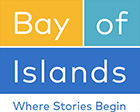How did the Tourism Operations Certificate come into being?
A population of storytellers: the way forward for regional tourism
When COVID hit in early 2020, Northland tourism was smashed: the visitors stayed away, and tourism businesses went into hibernation. Workers were at risk of losing jobs and moving to other industries. The Bay of Islands (BOI) Marketing Group used the lull in visitor numbers to launch a revolutionary idea it had been brewing for some time: upskill the people by turning them into storytellers. If they could take customer-facing workers in hospitality and tourism from around the region, and increase their knowledge of the whole region as well as give them confidence, then Northland people could become the “sales engine” for the region. They would have the ability to showcase the best of Northland from the heart and extend tourist stays. Just as importantly, the course would keep these workers paid and in the industry right through lockdown (their wage subsidy extended) ready to be called on again once the summer season began, avoiding redundancies and Work and Income benefits, as well as advancing their future prospects and career opportunities. The Group pitched to the central government, which loved the idea.
Funding was granted by the Ministry for Social Development (MSD), and the Ministry for Business, Innovation and Employment (MBIE). BOI Marketing Group came up with the course structure, to be run through the local branch of tourism and hospitality management education provider Queenstown Resort College (QRC). The 17-week course, called QRC Certificate in Tourism Operations Level 4, would introduce students to the New Zealand tourism industry and the art of telling Northland’s ‘tourism story’ with a crash course on Northland’s history, the tourism industry, manaakitanga philosophies, and familiarisation visits. Special dispensation from MSD ensured students could still work their jobs part-time when required, while they studied. Interest was huge, with more than 200 applicants, narrowed down to 100 from 22 organisations for the first wave.

The beginning of the Tourism Operation Certificate in the Bay of Islands
The December graduation at the Treaty grounds was described as incredibly moving. A key anecdote was that many participants took up tertiary study for the first time and for them to demonstrate achievement to their whanau has lifted ceilings, given confidence, and inspired other family members to consider alternate, more progressive pathways.
2021 will be the second year of the pilot. Constantly being refined, future iterations of the programme might include shorter training courses throughout the region, using materials generated from the pilot.
